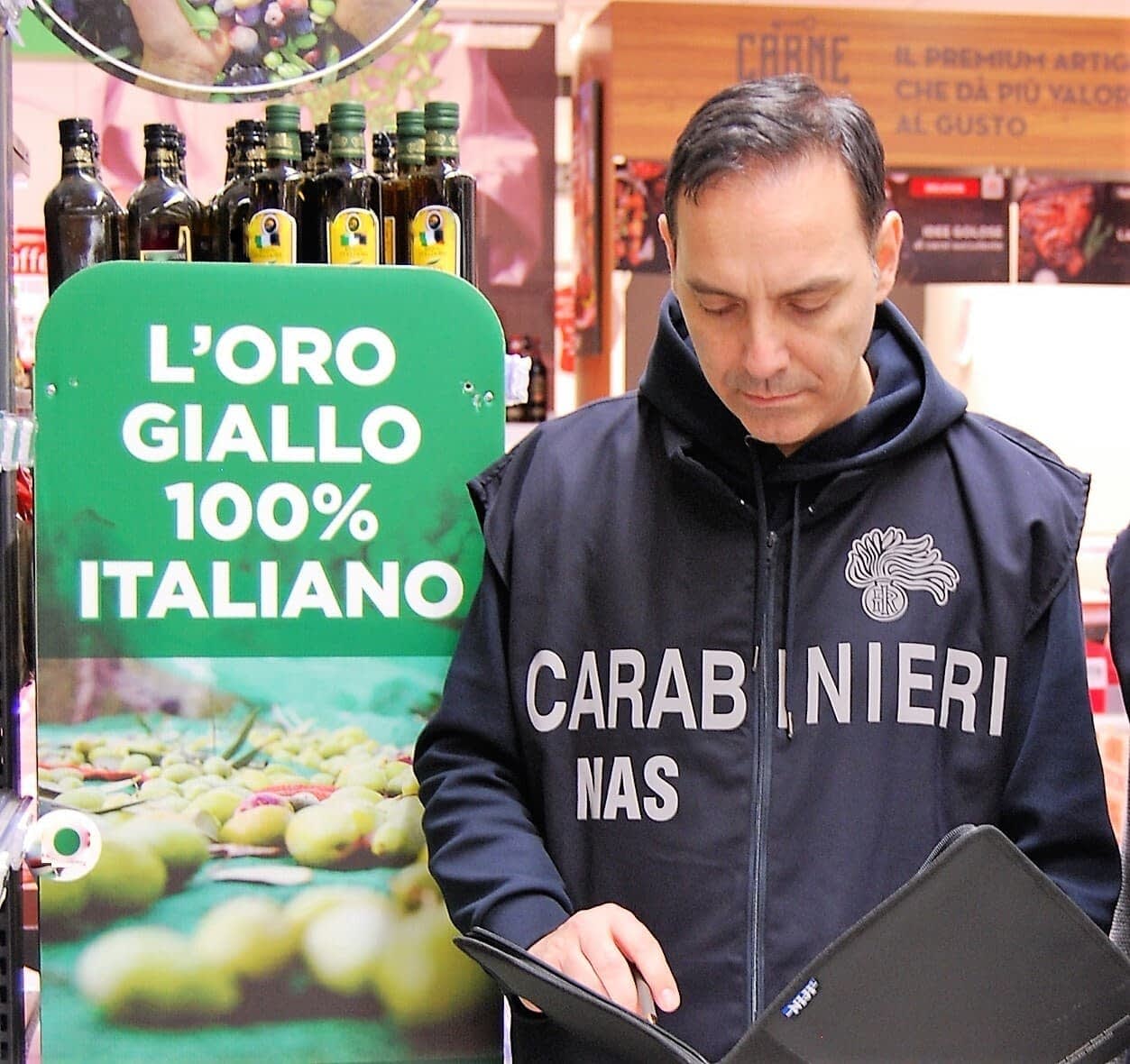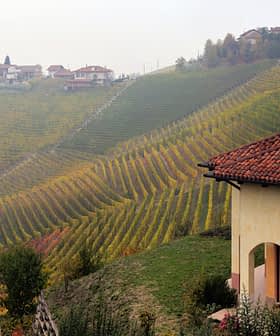Italian Police Official Explains How Olive Oil Fraud Works
意大利警方官员解释了橄榄油欺诈的运作方式
As the ways in which olive oil fraud is perpetrated have evolved, law enforcement has worked hard to keep up.
随着橄榄油欺诈方式的演变,执法部门一直在努力跟上。
 Carabinieri officers inspect potentially fraudulent olive oil during a raid. (Photo: Carabinieri NAS)
Carabinieri officers inspect potentially fraudulent olive oil during a raid. (Photo: Carabinieri NAS) 2024 年 8 月 26 日 16:55 UTC
宪兵官员在突袭期间检查了潜在的欺诈性橄榄油。(照片:Carabinieri NAS)
Fraud and counterfeiting operations continue to pose significant challenges for the olive oil industry.
欺诈和假冒操作继续对橄榄油行业构成重大挑战。
In Italy, one of the world’s largest olive oil producers, specialized police units actively combating the illicit food trade, explicitly focusing on olive oil adulteration.
在意大利,世界上最大的橄榄油生产国之一,专门的警察单位积极打击非法食品贸易,明确关注橄榄油掺假。
Genuine, high-quality olive oil is a prime target for criminal organizations. Counterfeit olive oil, falsely labeled as a PDO (Protected Designation of Origin) or PGI (Protected Geographical Indication), undermines legitimate producers and poses serious risks to consumer health.
正宗、优质的橄榄油是犯罪组织的主要目标。假冒橄榄油,被错误地贴上 PDO(受保护的原产地名称)或 PGI(受保护的地理标志)标签,破坏了合法生产商,并对消费者健康构成严重风险。
A very low price for products like extra virgin olive oil is often a sign of low-quality oil, likely imported or blended with seed oil.
特级初榨橄榄油等产品的价格非常低通常是劣质油的标志,可能是进口或与种子油混合。
For criminals, counterfeit high-quality food can yield substantial profits. This trend is prevalent across many staples of Italian cuisine, with olive oil being a particularly lucrative target.
对于犯罪分子来说,假冒优质食品可以产生可观的利润。这种趋势在意大利菜的许多主食中都很普遍,橄榄油是一个特别有利可图的目标。
The Central Inspectorate for the Protection of Quality and Fraud Repression of Agri-food Products (ICQRF), an agency under the Ministry of Agricultural and Forestry Policies, reported that in 2023 alone, 380 tons of illegal olive oil products, with a value exceeding €2 million, were seized.
农业和林业政策部下属机构农业食品质量保证和欺诈打击中央检查局 (ICQRF) 报告称,仅在 2023 年,就查获了 380 吨非法橄榄油产品,价值超过 200 万欧元。
“Extra virgin olive oil, along with PDOs and PGIs, are premium products that continue to grow in volume and market share,” Lieutenant Colonel Michele Avagnale, commander of the Carabinieri Health Protection Group (NAS) in Naples, a specialized unit within the Italian police forces, told Olive Oil Times.
“特级初榨橄榄油以及 PDO 和 PGI 是优质产品,在数量和市场份额方面不断增长,”意大利警察部队的一个专门单位那不勒斯宪兵健康保护小组 (NAS) 指挥官米歇尔·阿瓦尼亚莱 (Michele Avagnale) 中校告诉 Olive Oil Times.
另见:利用人工智能提高橄榄油质量、效率和信任
“Italy’s olive oil industry involves numerous key players, from producers and olive mills to both primary and secondary processing industries, as well as companies that purchase Italian and foreign olive oil to create blends or bottle and sell it to the final distribution companies,” Avagnale explained.
“意大利的橄榄油行业涉及众多主要参与者,从生产商和橄榄厂到初级和次级加工业,以及购买意大利和外国橄榄油以制造混合物或装瓶并将其出售给最终分销公司的公司,“Avagnale 解释说。
“Similar types and grades of olive oil can be legally blended,” he added. “European Union legislation stipulates that a legitimate extra virgin olive oil blend consists solely of extra virgin olive oils that belong to the same commercial category and fully comply with extra virgin olive oil regulations.”
“类似类型和等级的橄榄油可以合法混合,“他补充道。“欧盟立法规定,合法的特级初榨橄榄油混合物仅由属于同一商业类别并完全符合特级初榨橄榄油法规的特级初榨橄榄油组成。”
This is where illegal blending comes into play, undermining the market and posing potential threats to consumer health.
这就是非法混合发挥作用的地方,破坏了市场并对消费者健康构成潜在威胁。
“When we talk about food fraud, I would speak about tangible damages rather than risk factors,” Avagnale said. “Food fraud is a serious threat to public health. Criminals seek to deceive consumers by selling products that do not match what is stated on the label.”
“当我们谈论食品欺诈时,我会谈论有形损害而不是风险因素,“Avagnale 说。“食品欺诈是对公共卫生的严重威胁。犯罪分子试图通过销售与标签上声明不符的产品来欺骗消费者。

Lieutenant Colonel Michele Avagnale commands a national police unit dedicated to fighting and preventing food fraud. (Photo: Carabinieri NAS)
Michele Avagnale 中校指挥着一支专门打击和防止食品欺诈的国家警察部队。(照片:Carabinieri NAS)
Avagnale warned that food fraud inflicts damage in multiple ways, resulting in economic losses for consumers, businesses and the state.
Avagnale 警告说,食品欺诈以多种方式造成损害,给消费者、企业和国家造成经济损失。
“Public health may also be damaged since food containing harmful substances or those which alter the nutritional balance may be marketed,” he said. “Illegal blending involves mixing virgin or extra virgin olive oils with lower-quality oils, known as ‘lampante.’ These oils are then treated to remove any organoleptic or chemical defects.”
“由于可能销售含有有害物质或改变营养平衡的食品,因此公共卫生也可能受到损害,“他说。“非法混合涉及将初榨或特级初榨橄榄油与低质量的橄榄油混合,称为 'lampante'。然后对这些油进行处理以去除任何感官或化学缺陷。
Advanced blending technologies are also exploited to perpetrate olive oil fraud.
先进的混合技术也被用来实施橄榄油欺诈。
“Illegal blending can also involve linking containers of substandard products to those containing quality oil, blending them through specialized software,” Avagnale said. “Using this software, criminals can produce a product whose organoleptic and chemical parameters meet the E.U. regulations for extra virgin olive oils.”
“非法混合还可能涉及将不合格产品的容器与含有优质油的容器联系起来,通过专门的软件进行混合,“Avagnale 说。“使用此软件,犯罪分子可以生产出其感官和化学参数符合欧盟特级初榨橄榄油法规的产品。”
The accessibility of the technology has enabled criminal organizations to refine their operations, exploiting the popularity of olive oil for profit. Consequently, NAS has also had to enhance its technology and methods.
该技术的可访问性使犯罪组织能够改进他们的运营,利用橄榄油的流行来牟利。因此,NAS 也必须增强其技术和方法。
“Agri-food crime has evolved over the years,” Avagnale said. “It no longer involves crude, easily detectable counterfeits through random sampling, such as the partial or complete blending of extra virgin olive oil with soybean, sunflower or palm oils mixed with chlorophyll or beta-carotene.”
“多年来,农业食品犯罪一直在发展,“Avagnale 说。“它不再涉及通过随机抽样进行粗糙、易于检测的假冒产品,例如将特级初榨橄榄油与大豆、葵花籽油或棕榈油与叶绿素或 β-胡萝卜素混合部分或全部混合。”
“Today, these crimes involve far more sophisticated frauds, making them difficult to detect with standard scientific analyses,” he added. “We often need to rely on genetic or other experimental analyses. In some cases, every individual batch of olive oil should be checked before blending.”
“今天,这些犯罪涉及更复杂的欺诈行为,因此很难通过标准的科学分析来检测,“他补充道。“我们经常需要依赖遗传或其他实验分析。在某些情况下,每批橄榄油在混合前都应进行检查。
“Moreover, packaging and labeling methods have also advanced,” Avagnale explained. “The use of high-quality materials and imaginative names makes it even more challenging to identify non-compliant products.”
“此外,包装和标签方法也取得了进步,“Avagnale 解释说。“使用高质量的材料和富有想象力的名称,使得识别不合规产品更具挑战性。”
NAS investigations may involve environmental and phone surveillance, inspections, controls, comparisons and extensive paper and electronic documentation analysis.
NAS 调查可能涉及环境和电话监控、检查、控制、比较以及广泛的纸质和电子文档分析。
“Additionally, companies often operate through networks of shell companies and use systems of false invoicing, complicating the reconstruction of commercial transactions,” Avagnale said. “These companies are typically linked to frontmen.”
“此外,公司经常通过空壳公司网络运作,并使用虚假发票系统,使商业交易的重建复杂化,“Avagnale 说。“这些公司通常与主唱有联系。”
“In the end, investigative activities often require the participation of international organizations and specific legal support,” he added. “During many investigations, it turned out that some products are purchased in one country, processed in another and sold elsewhere, making controls more difficult.”
“最后,调查活动通常需要国际组织的参与和具体的法律支持,“他补充道。“在许多调查中,事实证明,有些产品在一个国家购买,在另一个国家加工,然后在其他地方销售,这使得控制更加困难。”
Over 1,000 NAS agents are deployed across Italy, forming part of a broader food and pharmaceutical safety network operating throughout the E.U.
意大利各地部署了 1,000 多名 NAS 代理,构成了在整个欧盟运营的更广泛的食品和药品安全网络的一部分。
另见:掺假橄榄油的发现引发了关于北塞浦路斯测试的辩论
Italian law enforcement’s coordination with national and international agencies allowed for some of the most significant anti-counterfeiting and anti-fraud operations conducted in more than one olive oil-producing country.
意大利执法部门与国家和国际机构的协调允许在不止一个橄榄油生产国进行一些最重要的反假冒和反欺诈行动。
The most recent large-scale operation involved discovering more than 71 million tons of illicit oily substances in the southern Italian region of Puglia.
最近的大规模行动涉及在意大利南部的普利亚大区发现了超过 7100 万吨的非法油性物质。
“With olive oil, NAS investigations often begin with on-the-spot checks, frequently initiated by reports from consumers or associations,” Avagnale said.
“对于橄榄油,NAS 调查通常从现场检查开始,通常是由消费者或协会的报告发起的,“Avagnale 说。
NAS verifies compliance with regulations through sampling and extensive laboratory analysis.
NAS 通过采样和广泛的实验室分析来验证是否符合法规。
“When a non-compliant product is identified, safeguard procedures are immediately implemented,” Avagnale said. “These measures include suspending the business license, withdrawing the specific product and conducting further verification activities related to the production chain, traceability and commercial distribution.”
“当发现不合规产品时,会立即实施保护程序,“Avagnale 说。“这些措施包括吊销营业执照、撤销特定产品以及进行与生产链、可追溯性和商业分销相关的进一步验证活动。”
To help combat the international nature of food and olive oil fraud, E.U.-wide alert systems, such as RASFF (Rapid Alert System for Food and Feed), are integrated into NAS activities.
为了帮助打击食品和橄榄油欺诈的国际性质,欧盟范围内的警报系统,例如 RASFF(食品和饲料快速警报系统),被整合到 NAS 活动中。
“Established in the late 1970s, this tool has evolved to include materials and objects intended to come into contact with food, as well as pet food,” Avagnale said. “The system is accessible online, allowing all participants to share, activate and notify relevant information in real-time.”
“该工具成立于 1970 年代后期,现已发展到包括旨在与食物以及宠物食品接触的材料和物体,“Avagnale 说。“该系统可在线访问,允许所有参与者实时共享、激活和通知相关信息。”
Avagnale emphasized that consumers can play a crucial role in reducing and combating food fraud, particularly in the olive oil sector, listing some simple recommendations consumers may follow:
Avagnale 强调,消费者可以在减少和打击食品欺诈方面发挥关键作用,尤其是在橄榄油领域,并列出了消费者可以遵循的一些简单建议:
- Purchase products from trusted stores and markets, not from improvised vendors;
从值得信赖的商店和市场购买产品,而不是从临时供应商那里购买产品; - Learn how to recognize raw materials, their origins and their history;
学习如何识别原材料、它们的来源和历史; - Read product labels carefully before purchasing to understand the exact composition of the food (ingredients, additives, preservatives), storage methods, expiration date, producer’s name, production batch, and the origin of raw materials;
购买前应仔细阅读产品标签,了解食物的确切成分(成分、添加剂、防腐剂)、贮存方法、食用期限、生产商名称、生产批次和原材料来源; - Give preference to seasonal foods with a “short supply chain” or “zero kilometers,” and opt for healthy, preferably home-cooked, meals;
优先选择“供应链短”或“零公里”的时令食品,并选择健康,最好是家常菜; - Be wary of over-processed food with numerous ingredients and unclear or barely readable labels;
警惕成分众多、标签不清晰或几乎无法阅读的过度加工食品; - Learn to recognize the distinct characteristics of foods;
学会识别食物的独特特征; - Exercise caution with low prices.
谨慎使用低价。
“A very low price for products like extra virgin olive oil is often a sign of low-quality oil, likely imported or blended with seed oil,” Avagnale said, providing a specific example of a NAS investigation into olive oil fraud.
“特级初榨橄榄油等产品的价格非常低通常是劣质油的标志,可能是进口的或与种子油混合的,“Avagnale 说,并提供了 NAS 对橄榄油欺诈进行调查的具体示例。

High olive oil prices at origin have made counterfeiting extra virgin olive oil especially lucrative. (Photo: Carabinieri NAS)
原产地的高橄榄油价格使假冒特级初榨橄榄油特别有利可图。(照片:Carabinieri NAS)
“It resulted in the judicial recognition of criminal responsibility for all involved, leading to various prison sentences and additional penalties, including trading prohibitions,” he said.
“它导致司法承认了所有涉案人员的刑事责任,导致了各种监禁和额外处罚,包括交易禁令,“他说。
The investigation began with a document search that uncovered handwritten notebooks and folders containing off-the-books records hidden inside a trapdoor.
调查从文件搜索开始,发现了手写笔记本和文件夹,其中包含隐藏在活板门内的账外记录。
“The company under investigation operated with a pyramidal structure: the chairman of the board of directors, who led the organization, managed intra-community oil trades, directed employees in assembling each batch, and supervised the chemical laboratory’s work,” Avagnale said.
“被调查的公司采用金字塔结构:董事会主席领导该组织,管理社区内部的石油贸易,指导员工组装每批产品,并监督化学实验室的工作,“Avagnale 说。
“Next in line was the administrative director, who acted in place of the chairman during his absence and managed relationships with the banks,” he added. “As for the employees, one managed the placement of bulk products in the market, while another served as the sales representative.”
“接下来是行政总监,他在董事长缺席期间代替董事长行事,并管理与银行的关系,“他补充道。“至于员工,一名负责管理散装产品在市场上的投放,而另一名则担任销售代表。”
Meanwhile, Avagnale said another employee handled the products’ constitution, assembly and filtration, which were then stored in the company’s warehouse.
与此同时,Avagnale 表示,另一名员工负责产品的组成、组装和过滤,然后存放在公司的仓库中。
“He was often responsible for blending the product, strictly following the chairman’s directives,” Avagnale added. “Additionally, the company employed an administrative worker responsible for updating the National Agricultural Information Service (SIAN).”
“他经常负责混合产品,严格遵循主席的指示,“Avagnale 补充道。“此外,该公司还聘请了一名负责更新国家农业信息服务 (SIAN) 的行政人员。”
SIAN is a mandatory electronic register where companies must record every entry, withdrawal, and blending of virgin and extra virgin olive oil. “It is part of an extensive control system overseen by external entities like the ICQRF,” Avagnale said.
SIAN 是一个强制性的电子登记册,公司必须记录初榨橄榄油和特级初榨橄榄油的每次进入、提取和混合。“它是由 ICQRF 等外部实体监督的广泛控制系统的一部分,”Avagnale 说。
“The chairman, the director and the employee responsible for maintaining the SIAN register were charged with complicity in falsifying records and notifications under Article 484 of the Italian Penal Code,” he added. “They had entered false data into the system regarding the purchase, movement, and processing of the oil batches stored in the company, intending to market virgin and extra virgin olive oil.”
“根据意大利刑法典第 484 条,主席、董事和负责维护 SIAN 登记册的员工被指控共谋伪造记录和通知,“他补充道。“他们在系统中输入了有关购买、移动和加工公司存储的油批次的虚假数据,打算销售初榨橄榄油和特级初榨橄榄油。”
“The comparison between accounting and non-accounting documentation, the results from the SIAN electronic register, and surveillance activities revealed discrepancies between what was officially recorded and what was sold, indicating efforts by the company to conceal fraud from the control authorities,” Avagnale explained.
“会计和非会计凭证之间的比较、SIAN 电子登记册的结果以及监控活动揭示了官方记录的内容与出售的内容之间存在差异,这表明该公司试图向控制机构隐瞒欺诈行为,“Avagnale 解释说。
The alleged fraud was categorized into commercial fraud, related to the product’s organoleptic characteristics, and fraud concerning geographical origin, which involved illegal blending.
涉嫌欺诈分为商业欺诈(与产品的感官特性有关)和涉及地理来源的欺诈(涉及非法混合)。
“In the investigations concerning fraud related to the product’s organoleptic characteristics, investigators utilized environmental and wire surveillance in addition to analyzing accounting and non-accounting records,” Avagnale said.
“在对与产品感官特性相关的欺诈行为的调查中,调查人员除了分析会计和非会计记录外,还利用了环境和网络监控,“Avagnale 说。
“What enabled investigators to obtain a detailed and accurate understanding of events were the notebooks, manuscripts and folders labeled ‘internal cuts’ and other similar records,” he added. “The illegal activity involved the national and international wholesale of large batches of olive oil.”
“使调查人员能够对事件进行详细和准确的了解的是那些标有'内部剪辑'的笔记本、手稿和文件夹以及其他类似记录,“他补充说。“非法活动涉及大批量橄榄油的国内和国际批发。”
Avagnale said the documents detailed how the company imported lampante olive oil from Spain and Italy in bulk before blending them, bottling and labeling the product as extra virgin olive oil.
Avagnale 表示,这些文件详细说明了该公司如何从西班牙和意大利批量进口 lampante 橄榄油,然后再将它们混合、装瓶并将产品标记为特级初榨橄榄油。
“This was supported by chemical-physical and organoleptic controls conducted by the internal laboratory,” Avagnale explained. “These materials were irregular, consisting of products with very high levels of peroxide and acidity.”.
“这得到了内部实验室进行的化学物理和感官控制的支持,“Avagnale 解释说。“这些材料是不规则的,由过氧化物和酸度非常高的产品组成。”
“Furthermore, large quantities of olive oil differed in origin and quality due to using raw materials of varying nature and origin,” he added. “Nevertheless, they were sold to buyers and labeled as extra virgin olive oil or 100 percent Italian extra virgin olive oil, leading to charges under Articles 515 and 517-bis of the Italian Penal Code for commercial fraud, aggravated by the misuse of the origin protection mark.”
“此外,由于使用了不同性质和来源的原材料,大量的橄榄油在来源和质量上存在差异,“他补充道。“尽管如此,它们还是被卖给了买家,并被贴上了特级初榨橄榄油或 100% 意大利特级初榨橄榄油的标签,导致根据意大利刑法典第 515 条和第 517-二条被指控商业欺诈,滥用原产地保护标志加剧了这种情况。”








